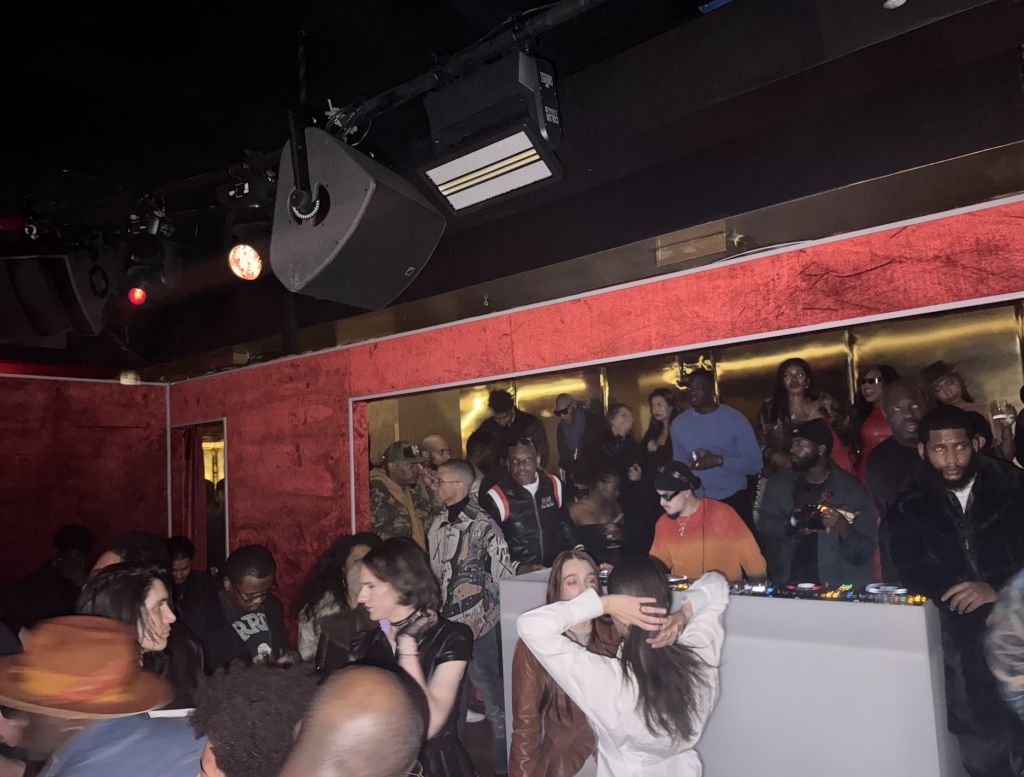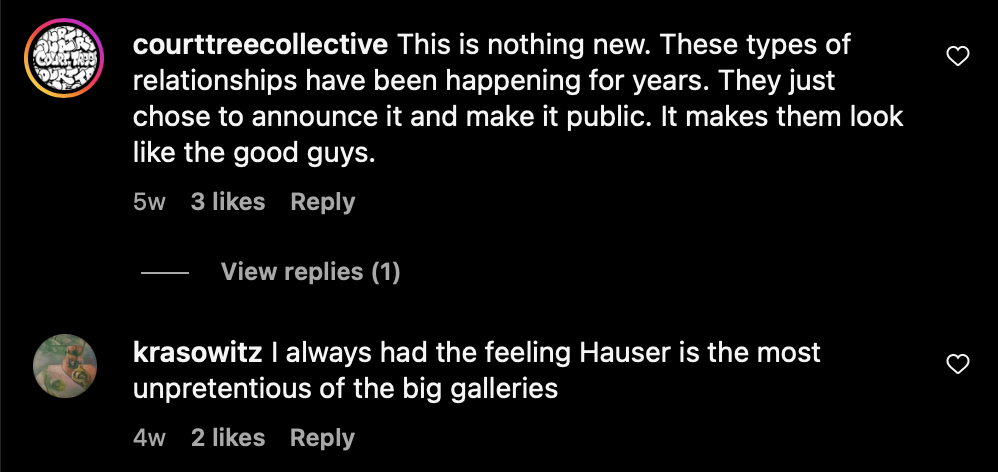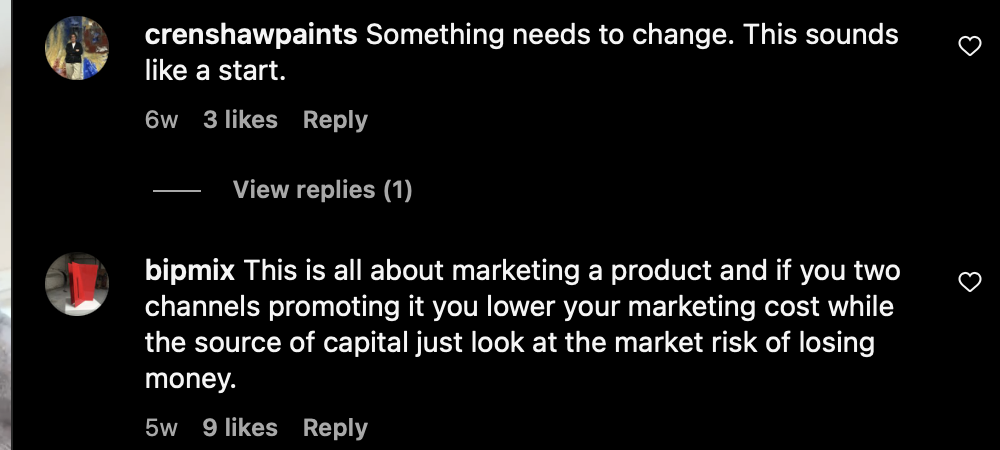Wet Paint
Silencio Opens in New York City, Art Worlders Spars Over the Joint-Representation Model, and More Juicy Art World Gossip
Plus, what Los Angeles gallery is moving to Hollywood? Which artists love to shop at the Harry Potter store?

Plus, what Los Angeles gallery is moving to Hollywood? Which artists love to shop at the Harry Potter store?

Annie Armstrong

Every week, Artnet News brings you Wet Paint, a gossip column of original scoops. If you have a tip, email Annie Armstrong at [email protected].
After a very long night, I write with good news. New York is now home to a club that is beloved on the international art circuit: The Parisian lounge Silencio, which was designed by director (and Pace-represented painter) David Lynch, has hung out a shingle in Manhattan. Yesterday evening, the art world christened it.
For the uninitiated: Silencio has been a mainstay on the scene since 2011, a celebrity magnet and recurring party space during FIAC (RIP) and now Paris+. (Last year, Karma threw a notably fun party there.) The club has followed the jet-set culturati around the world since then, launching a pop-up during Art Basel Miami Beach back in 2016 and cropping up for parties during the Cannes Film Festival and Milan Fashion Week. The New York space, which south of Columbus Circle, will be permanent, though, and is helmed by its founder and CEO Arnaud Frisch.
When I got the email that Swizz Beatz and Alicia Keys would be continuing the opening celebrations for their show at the Brooklyn Museum, “Giants: Art from the Dean Collection of Swizz Beatz and Alicia Keys,” at the new Silencio, I dropped all of my previous plans and headed over.
“You just missed Max Hollein!” dealer Morgan Aguiar-Lucander told me from the crowd smoking cigarettes outside. Located at the bottom of a long-sloping staircase, the space certainly recalls its Paris arm, and it is bathed in the same red light that gives the club a distinctly iguana-tank kind of feel (it kind of smelled like one, too). Mingling around the room were a cast of art-world A-listers: artist Mickalene Thomas, collector Tif Zabludowicz, artist Derrick Addams, and former Art Basel chief Marc Spiegler.
The party was jam-packed, and most attempts I made to get an on-the-record quote were met with “What?!” screamed into my recorder. One art dealer I ran into summarized it perfectly on her way out: “I’m just glad I can use the word ‘clubbing’ in New York again.”
View this post on Instagram
A post shared by Carrie Scott – Art Historian + Curator (@carriescottcurates)
It is a tale as old as time: An artist gets some attention, demand for their work grows, and before long, mega-gallery directors are making studio visits. Soon, the artist is decamping for one of those multinational firms, leaving behind the galleries that first backed them. Accusations of exploitation and unfaithfulness have been known to fly.
Lately, though, there have been cases of megas choosing to instead share the representation of an artist with a smaller gallery—a practice that has earned both praise (healthy for both the artist’s career and their original supporters!) and a measure of skepticism (will the artist and smaller gallery actually be treated fairly?).
Last week, curator Carrie Scott posted an Instagram video on the topic that seemed to hit a nerve with some in the art industry. “Anyone else really curious about these joint representation announcements that Hauser & Wirth keep making?” she asked with a skeptical tone, before referencing the recent news that the mega would be co-repping the artist Uman with New York’s Nicola Vassell Gallery. (Hauser’s president, Marc Payot, referred to the joint representation as a “collective impact initiative,” as you may recall.) The giant also said it is sharing representation of painter Ambera Wellmann with Company Gallery, also of New York.
Prominent Instagram users had some thoughts. Adviser Sheri Pasquerella, pundit Hilde Lynne Helphenstein (aka Jerry Gogosian), and artist-critic Walter Robinson weighed in on whether the collaborative model is beneficial for all parties, or a way for the mega to “market test” an artist before scooping them up entirely, as Helphenstein put it. “If they thought the artist was economically worth investing in long term they wouldn’t waste their time,” she said.
Hauser is not the only mega embarking on these joint-representation models. Just yesterday, it was announced that New York veteran Andrew Kreps would be sharing representation of the esteemed painter Raymond Saunders, who’s 90 this year, with ultra-heavyweight David Zwirner, so I got them to explain their thinking.
“Speaking for myself, it’s just the best way to serve the artist,” Kreps said, explaining that the co-representation was his idea. “I’ve known David forever, and we’re friendly and we chat. I’ve never called him about anything like this ever, but it was just like, ‘Who would I love to work with?’ I just want everyone to see the work.’ ”
“Andrew reached out to me late last year to introduce me to the work of Raymond Saunders, and I was mesmerized immediately,” Zwirner said in an email. “Seeing the work in Andrew’s gallery I felt I was in the presence of a major American voice in painting, who has not received his proper due… I feel strongly that his work deserves a much wider audience.”
Kreps also shares representation of the estate of the late, great painter Ernie Barnes with the smaller Ortuzar Projects, who’s nearby in Tribeca. And he has long repped photographer Roe Ethridge alongside the mighty Gagosian empire.
“There have been cracks in the old system for some time now, and it’s been refreshing to see more willingness to try new ways of doing things,” Kreps told me. “I think that there’s a recognition that sometimes a thing can be worth more than the sum of its parts. That’s how I see the value of these shared representation models: The estate or artist is getting more than just two galleries. They’re getting something intangible in terms of a network of support.”
Dealer Ales Ortuzar chimed in to note that the key to their successful relationship over the Barnes estate comes from neither gallery being “clearly dominant, with the other only involved symbolically or for optics.”


Hauser & Wirth, Company Gallery, and Nicola Vassell did not respond to requests for comment.
Max Hooper Schneider’s fantastical sculpture Route 666 has been acquired by MOCA Los Angeles… Arty Nelson is moving his Los Angeles gallery One Trick Pony over to Santa Monica Boulevard from Fairfax, adding another shop to the cluster on Melrose Hill… London-based gallery Rose Easton has picked up representation of the lovely Jan Gatewood, whose poignant collage work can inspire both laughter and critical thought in equal parts … Critic Harry Tafoya has started a new monthly column of art reviews for Paper magazine… We love to see fresh blood! Twenty new members have joined the New Art Dealers Alliance, including downtown New York up-and-comers Blade Study, March, and Sara’s Worldwide, as well as Miami’s KDR, among many other exciting and scrappy operations from cities like Buenos Aires, Minneapolis, Bogotá, and Atlanta…
Serendipitously, artists Avery Singer and Hugh Hayden caught each other doing some shopping at the Harry Potter store *** RxArt, which taps leading artists to enliven children’s hospitals, held its annual fête toasting painter Harold Ancart‘s contribution to the charity this year, and Gagosian dealer Antwaun Sargent, artist Hilary Pecis, and Ancart’s girlfriend, actress Dianna Agron all rolled up to celebrate at the Bowery Hotel *** Installation-art king Jonah Freeman made some of the album artwork for MGMT’s upcoming comeback album, Loss of Life. (The duo also DJed a Whitney party last week. I’d like to personally welcome the elder statesmen of indie sleaze into the art world fray.) *** Speaking of old-school indie, did anyone else clock that Vampire Weekend has a track titled “Mary Boone” on their upcoming album? ***